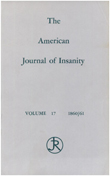High risk for attention deficit hyperactivity disorder among children of parents with childhood onset of the disorder: a pilot study
Abstract
OBJECTIVE: Although well-documented in clinical and epidemiological studies of attention deficit hyperactivity disorder (ADHD) in children, the familial nature of the adult syndrome has not been well investigated. One approach to evaluate the familial nature of adult ADHD is through a high-risk design aimed at estimating the risk for the disorder in children of parents with child-hood-onset ADHD. METHOD: Children at risk for ADHD were ascertained from the study group of 84 referred adults with clinical diagnoses of childhood onset of the disorder, confirmed by structured interviews. Diagnostic information on the disorder was derived from the ADHD module of the Schedule for Affective Disorders and Schizophrenia for School Age Children-- Epidemiologic Version, supplemented with information regarding treatment for ADHD for the affected child and school history including repeated grades, placement in special classes, and tutoring. RESULTS: Of the 84 children at risk, 48 (57%) met criteria for ADHD. The rate of the disorder in children of adults with the disorder was significantly higher than the previously reported rate of ADHD among siblings of children with the disorder. Of the 48 ADHD children of parents with the disorder, 36 (75%) were treated for it. The rates of school failure were almost identical to those previously reported in a group of referred children and adolescents with ADHD. CONCLUSIONS: These results support the validity of the adult diagnosis of ADHD and suggest that the adult form of this disorder may have stronger familial etiological risk factors than its pediatric form. If these results are confirmed, families selected through adult probands with ADHD might be especially useful for testing genetic hypotheses about the disorder.
Access content
To read the fulltext, please use one of the options below to sign in or purchase access.- Personal login
- Institutional Login
- Sign in via OpenAthens
- Register for access
-
Please login/register if you wish to pair your device and check access availability.
Not a subscriber?
PsychiatryOnline subscription options offer access to the DSM-5 library, books, journals, CME, and patient resources. This all-in-one virtual library provides psychiatrists and mental health professionals with key resources for diagnosis, treatment, research, and professional development.
Need more help? PsychiatryOnline Customer Service may be reached by emailing [email protected] or by calling 800-368-5777 (in the U.S.) or 703-907-7322 (outside the U.S.).



